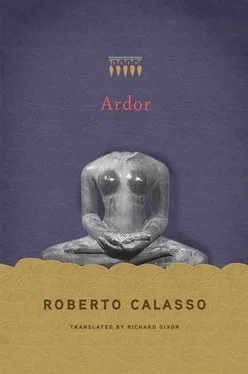* * *
The journey of the black antelope was also the journey of a remote thought that crossed the passes of Afghanistan to settle on the plains of the Ganges. The Vedic people apparently wished to go no farther. They continued to worship a plant that grew in distant mountains. It was increasingly difficult to get hold of. Less and less frequently could they press its juices. Through that plant, they worshipped rapture. It was the ultimate thing to conquer.
Where the black antelope roams is civilization. And the black antelope has fled from the sacrifice, which is the foundation of civilization. Civilization thus extends as far as where a creature that has fled from civilization roams, a creature that did not want to be killed by civilization.

Thousands of pages in the Brāhmaṇas, and all the hymns in the ninth cycle of the Ṛgveda , are dedicated to soma. Of the few realia mentioned in the texts, soma is the most present. We cannot be sure what it was, except for saying: it was a “juice,” soma , which produced intoxication. Attempts at identifying it, from the mid-nineteenth century up to today, have all been rather awkward and unreliable. Nor do they explain why soma was already spoken of in the Vedic era as something from the past, for which a substitute had to be found in the rites. But how can its intoxicating effect be substituted? This is one of the many sharp ironies that anyone venturing into the Vedic world encounters. Not surprisingly, it is ignored, intentionally or otherwise, by many scholars who continue to treat soma like an algebraic symbol. It is more important — they argue — to make a precise reconstruction of the rites that celebrated soma , and less important to know what exactly they celebrated. The moderns, as a rule, are proud when they make statements of this kind, since they are indifferent about substance in general and concerned only with getting the procedures clear. In this way they think they have risen high up the evolutionary ladder.
But not knowing what soma was is like not knowing what fire is. For Agni and Soma are two gods, but they are also a flame and a plant — and, through that flame and that plant, they are the only gods in a continual voyage backward and forward between earth and sky. Not to know any more about the plant called soma is a grievous gap in our knowledge.
The expanding of the mind caused by soma did not stop at the flammantia moenia mundi , the blazing walls of the world. It went beyond. The mind darted beyond every barrier and watched everything from high above: “I extend beyond the sky and this great earth,” proclaims Indra (or anyone who feels like Indra). And in the meantime, at the end of every stanza, he repeats, as an obsessive murmur: “Have I drunk soma ?” The speaker is no longer part of the world, but observes it from outside, as if watching a game or a puppet show. Intoxication, omnipotence, effortlessness: “I want to put this earth here or there,” “Soon I want to push this earth here or there.” The Vedic ritualists measured power on this sensation. In normal life, they lived in temporary huts and migrated with their herds. But when they tasted soma , the whole earth and sky became their faithful subjects, ready to let themselves be shaped or annihilated by a sovereign touch. When they spoke of power, they did not mean empires, which they ignored, but that sensation of a single person, of every individual who had taken part in a soma sacrifice and had taken a sip from one of the rectangular wooden cups, camasas , in accordance with the rules of the liturgy.
Childlike and grandiloquent, Indra was the first to sing of soma —and only soma could inspire the fervor that allowed him to perform his heroic deeds. One of which was the capture of the soma itself, thanks to an inversion of time that was intrinsic in Vedic logic. One day the other gods spitefully refused Indra the soma. He had committed too many crimes, beginning with the beheading of the three-headed Viśvarūpa, who after all was a brahmin. But if Indra was to be refused the soma , then this should apply as much to the kṣatriyas. The juice that gives the feeling of sovereignty was forbidden to the king of the gods himself and to the men who modeled themselves on him.
Meanwhile the brahmins drank soma —and kept silent. Indra celebrated soma —and could no longer drink it. Suddenly, in a flash, a secret, obstinate, unending conflict broke out between the two sovereign powers, between priest and king, who were required to work together. The Veda, unlike the rest of the world that would follow, was always biased in favor of the priests, without it being too apparent.
Who is noble? Anyone who can boast “ten consecutive ancestors who drank soma. ” But, to drink soma , you had to be invited. Indra’s offense — greater than any other — was that of having tried to drink soma by force. Tvaṣṭṛ had refused to invite him. This was understandable, since Indra had just killed his son. But Indra should nevertheless have been invited by another brahmin, if not by Tvaṣṭṛ. This is the fundamental weakness of the kṣatriyas : their king has to be invited to drink soma. And only a brahmin can invite him. It is a question of intoxication, even of pure power. It is said that brahmins who drink soma can kill with their eyes.
* * *
The life of Soma—“the least understood god of the Vedic religion,” Lommel once wrote — has been left in obscurity because many have thought it enough to identify him with the soma plant or (later on) with the moon. But being an intoxicating juice, a celestial body, a king, and a god, all at the same time, is not in itself a problem for Vedic thought. In his royal manifestation, Soma was the head of a dynasty — the lunar dynasty —that cuts through the whole of Indian mythical history up to the Mahābhārata.
Soma’s father was one of the Saptarṣis: Atri, the Devourer. For three thousand years he had practiced tapas with his arms raised. He seemed like “a piece of wood, a wall, or a rock.” So heightened was his consciousness that he never blinked. And one day a juice began to trickle from his eyes and illuminated every corner: it was Soma. The goddesses that kept control over all directions gathered together to receive that glow in their wombs. But the light spilled over. Soma’s fetus fell to the ground and Brahmā placed it on a chariot drawn by white horses, which began to roam the skies, spreading a pearl-like glow. They said: “It is the moon.” At that time Dakṣa, the chief brahmin, had to marry off his sixty daughters. He looked up at the lunar radiance and decided to entrust twenty-seven of them to Soma. Soma would receive them, night after night, on his journey through the sky. And each daughter was to enjoy him in equal measure. They became the houses of the moon, the first silver-sequined corps de ballet. Then Soma was consecrated king with the celebration of a grand rite, where the future sovereign offered the three worlds as recompense to the ṛṣis who had officiated over the sacrifice.
At the end, Soma cleansed himself in the avabhṛtha bath that marked the conclusion of the rite. He immediately felt relieved, buoyant, free of responsibility at last. All the gods, all the ṛṣis had worshipped him. He was sovereign over all. What did he lack? Liberty. That strange intoxication that flows from liberty. He felt that new waves were crashing in his mind: arrogance and lust. What would the worst outrage be? To abduct the wife of a brahmin. Soma knew very well that “even if a woman has had ten non-brahmin husbands, if a brahmin once takes her hand then he alone is her husband to the exclusion of all others.” But no one could resist Soma, the fluid that penetrates everywhere and makes all desirable. And so he set his eye on Tārā, wife of Bṛhaspati, chaplain to the gods. It wasn’t difficult to snatch her, and it was thrilling to have intercourse with her, with her exquisite round, moon face.
Читать дальше













